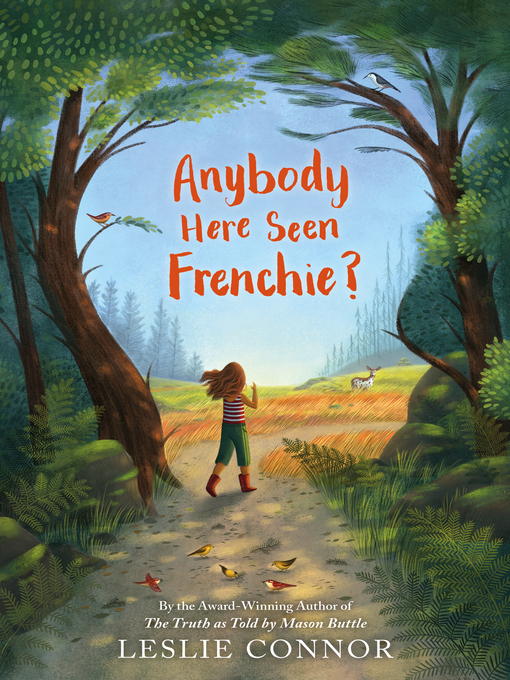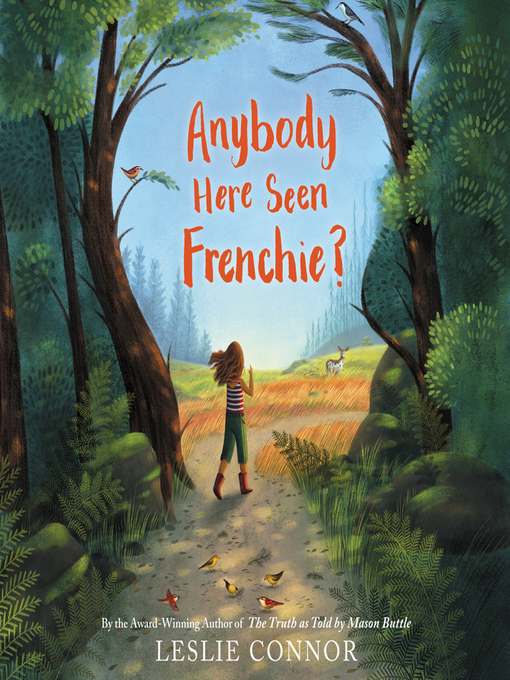Review by Booklist Review
Aurora and Frenchie have been inseparable since the day Frenchie chose her to be his best friend. Though Frenchie has autism and is nonverbal, the two have a special way of communicating and share a love of nature, particularly birds, rocks, and piebald deer. At school, Aurora and Frenchie are equally close, having been in the same class since the third grade. Aurora is devastated when she and Frenchie are not assigned to be in the same class this year, but she adjusts when she makes new friends, and Frenchie is assigned a new aide. But one morning, Frenchie goes missing from school, and the community comes out in a race against time to find Frenchie. Aurora feels guilt over her friend's disappearance and will not rest until he is found. Told from multiple points of view and flashbacks, Connor (The Truth as Told by Mason Buttle, 2018) utilizes elements of suspense and pastoral literature to create an engaging story. A strong choice for readers seeking stories with neurodiverse characters or books with heartwarming friendships.
From Booklist, Copyright (c) American Library Association. Used with permission.
Review by Publisher's Weekly Review
In alternating perspectives, Connor (The Truth as Told by Mason Buttle) centers two neighbors, both sixth graders cued as neurodivergent, in a coastal Maine town. Having a tendency to blurt and "trouble keeping still," self-described rock hound Aurora Petrequin "tells it like it is." She's fast friends with Frenchie Livernois, who communicates via physical responses his need for routine and interest in the natural world--particularly birds. But when Frenchie disappears one morning, Aurora worries that her actions have resulted in a "Worst Possible" event, similar to the time she briefly lost her little brother on a hike. As the close-knit town organizes a tense search-and-rescue, occasional interstitials position community members' whereabouts and sightings of a piebald deer. Aurora's buoyant first-person telling dominates the narrative, interspersed with occasional third-person chapters that detail Frenchie's perspective in sensorially evocative language. Though this positioning at times minimizes Frenchie's mode of expression, Connor's well-plotted mystery and affectionate portrayal of the children's--and their white families'--close friendship thoughtfully considers themes of claiming space and becoming oneself. Final art not seen by PW. Ages 8--up. Agent: Miriam Altshuler, DeFiore and Co. (Feb.)
(c) Copyright PWxyz, LLC. All rights reserved
Review by School Library Journal Review
Gr 5--7--"He doesn't answer. He never does. Not with words." This description aptly introduces readers to the life and personality of Nathan "Frenchie" Livernois, who does not speak and is autistic. Aurora (the narrator) is one person who truly understands Frenchie and his emotions. Aurora also navigates her own anxiety, from her strong dislike of itchy shirt tags to her constant struggle not to blurt out her first impression of someone or something. Together, Aurora and Frenchie enjoy riding the bus, looking at birds, and running 100-yard dash races at recess. When the two learn they will be in different classes for sixth grade, Aurora is nervous for Frenchie. Within the first few days of school, Aurora makes two new friends, which changes everything. One day, Aurora misses the school bus pick-up in the morning and Frenchie disappears. With masterful skill, Connor shifts this part of the story from Aurora's narration to incorporate a variety of townspeople who have been impacted by Frenchie. Together, they form a search party to find him. This plot transition makes the book truly unique and shows how one person can make such a difference to strangers, near and far, without saying a single word. VERDICT Exploring the challenges of preteen life, neurodiversity, and the daily impacts people have on each other, this book will keep readers hooked until the end. Connor uses Frenchie's and Aurora's neurodivergent characteristics to build both suspense and compassion in a highly engaging and recommendable read.--Tracey Hodges
(c) Copyright Library Journals LLC, a wholly owned subsidiary of Media Source, Inc. No redistribution permitted.
Review by Horn Book Review
When eleven-year-old Frenchie Livernois, who is nonvocal and neuroatypical, goes missing in the Maine woods, Aurora Petrequin blames herself. Frenchie has been her best (and only) friend since third grade; now in sixth grade, Aurora (who has sensory and behavioral differences herself -- "All my ideas were the loud kind. Hard to keep inside") still takes seriously her self-appointed responsibility to look out for him. In this nuanced novel, Connor gives readers an authentic friendship between two neurodivergent kids, each of whom has a deep appreciation of the natural world. Through Aurora, we see Frenchie's humanity; in turn, Aurora's patience, perceptiveness, and empathy shine -- traits that few of her peers bother to notice. While the bulk of the narrative centers on the painstaking and nerve-wracking search for Frenchie, Connor weaves experiences from the friends' recent past into the present drama, adding complexity to the story and characters. Aurora's assured first-person voice is funny, heartwarming, and keenly observant ("My hair is doing that thing where it flattens onto my face. Clinging. Like scared hair"). Intermittent chapters are narrated in the third person from the perspective of a few key characters, which heightens the tension and moves the finely crafted plot forward to a well-earned happy resolution. Kitty Flynn January/February 2022 p.110(c) Copyright 2022. The Horn Book, Inc., a wholly owned subsidiary of Media Source, Inc. No redistribution permitted.
(c) Copyright The Horn Book, Inc., a wholly owned subsidiary of Media Source, Inc. No redistribution permitted.
Review by Kirkus Book Review
Sixth grader Aurora Petrequin needs to say whatever she's thinking. She's loud. Eleven-year-old Frenchie Livernois, her next-door neighbor, is autistic and nonvocal. Yet the moment these opposites meet they fit together perfectly. Frenchie focuses Aurora's energy and helps her slow down and observe. Aurora looks out for Frenchie and leads him on adventures both nature lovers enjoy. But when Frenchie vanishes one day before school, Aurora, who feels bad about how often she messes up, realizes this is a "Worst Possible" fear come true, and her understanding of their best friendship is put to the test. Where did he go? Could she have stopped him from disappearing--and did she cause him to go? What does it all have to do with the piebald deer they spotted in the woods? Connor creates a playground of a coastal Maine town where the quirky locals are accessible and caring. Aurora's and Frenchie's families build an ecosystem that sustains and encourages their friendship, and Aurora's buoyant enthusiasm infuses the story with adventurous fun and a lack of preachiness while not undercutting real stakes. However, Frenchie, although treated with respect, is a bit shortchanged and on occasion robbed of narrative autonomy. It can feel like he is being discussed rather than being involved, a situation compounded by the fact that fewer portions of the story are narrated from his point of view. Main characters default to White; Aurora is cued as neurodiverse. Honors the sweet mysteries of how to communicate with each other and the world. (Fiction. 8-12) Copyright (c) Kirkus Reviews, used with permission.
Copyright (c) Kirkus Reviews, used with permission.


